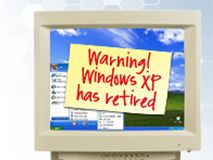Dental practices and Windows XP-osure

Microsoft cut off support and stopped providing security updates for Windows XP more than a year ago, yet many dental practices continue to run on the XP platform. Each day that you stay on the same outdated, unsupported platform, you expose your data to risk, which has already proven to be a $100 million nightmare for retailers across the U.S. The 2014 hacks of Home Depot and Target that exposed millions of credit cards were linked to the outdated Windows XP operating system.
Hackers are not restricting their efforts to large corporations. Recent research indicates that your practice's protected health information (PHI) can be 10 to 20 times more valuable on the black market than credit card numbers, making your practice an enticing target for cybercriminals.
The beauty of a living, breathing operating system is that manufacturers, like Microsoft, stay a step ahead of hackers by monitoring and patching security vulnerabilities. Upgrading your Windows XP computers will provide better data protection and might keep you clear of potential HIPAA security violations.
Why Are Dental Practices Still Using XP?
Maybe you just didn’t know that XP is no longer supported. Perhaps you have had a false sense of security that the status quo is sufficiently protected. Or, the cost of replacing outdated computers and operating systems is keeping you from upgrading. Whatever the reason, now is the time to upgrade before you risk your practice.
XP-osure Risks
The cost of capital expenditures is often cited as the reason practices don’t upgrade. However, the risks of staying with XP and suffering a data breach far outweigh the cost of upgrading.
Every healthcare data breach is met with stiff HIPAA financial penalties, which can cost you thousands or even hundreds of thousands of dollars. Also, a recent poll indicates that 40% of dental patients are likely to look for another dentist if their personal information is stolen. To make matters worse, exposing your patients’ PHI will land your practice on the federal government’s “Wall of Shame,” which can cause irreparable damage to your reputation. Is keeping your old computers worth the risk of losing your practice?
XP Stunts Your Growth
The security dangers aren’t the only reason to kick XP to the curb. If you continue to trap your dental practice in XP, you’re missing out on newer, more efficient technologies that can enhance your bottom line. Software and hardware manufacturers are optimizing their products to work best with newer versions of Windows. As a result, you can expect more compatibility issues between newer practice management programs, dental equipment and the outdated, unsupported Windows XP.
TechCentral Can Lay XP to Rest
Our experts at Henry Schein TechCentral have helped many practices make a smooth and affordable transition. Get started with a free technology assessment and an evaluation of your computer network needs. TechCentral’s assessment finds the best path forward for your practice, no matter the size or budget. For help with your upgrade, call 877-483-0382 and choose option 1 to speak with a TechCentral Windows upgrade expert, or visit http://www.HSTechCentral.com/solutions/windows-xp.aspx